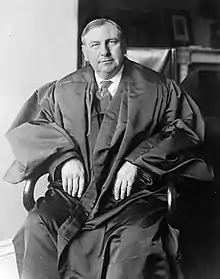robe
English

Etymology
From Middle English robe, roobe, from Old French robe, robbe, reube (“booty, spoils of war, robe, garment”), from Frankish *rouba, *rauba (“booty, spoils, stolen clothes”, literally “things taken”), from Proto-Germanic *raubō, *raubaz, *raubą (“booty, that which is stripped or carried away”), from Proto-Indo-European *Hrewp- (“to tear, peel”).
Akin to Old High German roup (“booty”) (Modern German Raub (“robbery, spoils”)), Old High German roubōn (“to rob, steal”) (Modern German rauben (“to rob”)), Old English rēaf (“spoils, booty, dress, armour, robe, garment”), Old English rēafian (“to steal, deprive”). Cognate with Spanish ropa (“clothing, clothes”). More at rob, reaf, reave.
Pronunciation
- (Received Pronunciation) IPA(key): /ɹəʊb/
- (General American) IPA(key): /ɹoʊb/
Audio (US) (file) - Rhymes: -əʊb
Noun
robe (plural robes)
- A long loose outer garment, often signifying honorary stature.
- c. 1603–1606, William Shakespeare, “The Tragedie of King Lear”, in Mr. William Shakespeares Comedies, Histories, & Tragedies […] (First Folio), London: […] Isaac Iaggard, and Ed[ward] Blount, published 1623, OCLC 606515358, [Act IV, scene vi]:
- Through tattered clothes small vices do appear; / Robes and furred gowns hide all.
-
- (US) The skin of an animal, especially the bison, dressed with the fur on, and used as a wrap.
- A wardrobe, especially one built into a bedroom.
- The largest and strongest tobacco leaves.
Derived terms
- bathrobe
Descendants
- → Irish: róba
- → Scottish Gaelic: ròb
Translations
|
Verb
robe (third-person singular simple present robes, present participle robing, simple past and past participle robed)
- (transitive) To clothe; to dress.
- (intransitive) To put on official vestments.
Synonyms
- (to clothe): dight, don, put on; see also Thesaurus:clothe
Derived terms
- berobed
Anagrams
- Bero, Boer, Ebor, Ebro, bore
Asturian
Verb
robe
- first-person singular present subjunctive of robar
- third-person singular present subjunctive of robar
Czech
Pronunciation
- IPA(key): [ˈrobɛ]
- Rhymes: -obɛ
- Hyphenation: ro‧be
Noun
robe m
- vocative singular of rob
Anagrams
- bore, oreb
Dutch
Etymology
From French robe.
Pronunciation
Audio (file)
Noun
robe f (plural roben or robes, diminutive robetje n)
- gown, robe
French
Etymology
Old French, from Proto-Germanic *raubō (“booty”), later "stolen clothing".
Pronunciation
- IPA(key): /ʁɔb/
audio (file)
Noun
robe f (plural robes)
- dress, frock
- fur, coat (of an animal)
- Ce cheval a une robe isabelle.
- wine's colour
Hypernyms
- habit
- vêtement
Derived terms
- noblesse de robe
- robe à tournure
- robe de chambre
- robe de mariée
- robe de nuit
- robe de soirée
Descendants
- → Dutch: robe
- → German: Robe
- → Czech: róba
See also
- Les couleurs de la robe d'un cheval /The colors of horses' hair/ : alezan, aubère, bai, blanc, crème, gris, isabelle, noir, palomino, pie, rouan, souris.
Further reading
- “robe”, in Trésor de la langue française informatisé [Digitized Treasury of the French Language], 2012.
Anagrams
- bore, orbe
Italian
Pronunciation
- IPA(key): /ˈrɔ.be/
- Rhymes: -ɔbe
- Hyphenation: rò‧be
Noun
robe f
- plural of roba
Anagrams
- ebro, orbe
Middle English
Alternative forms
- roobe, rob, robbe
Etymology
From Old French robe, from Frankish *rouba, *rauba, from Proto-West Germanic *raub, from Proto-Germanic *raubō, *raubaz, *raubą. Doublet of reif.
Pronunciation
- IPA(key): /ˈrɔːb(ə)/, /ˈrɔb(ə)/
Noun
robe (plural robes)
- robe (long loose garment):
- A robe as a symbol of rank or office.
- A robe as a spoil or booty of war; a robe given as a gift.
- (as a plural) The garments an individual is wearing.
Derived terms
- roben
- warderobe
Descendants
- English: robe
- → Irish: róba
- → Scottish Gaelic: ròb
- Scots: robe
References
- “rō̆be, n.”, in MED Online, Ann Arbor, Mich.: University of Michigan, 2007, retrieved 2018-06-16.
Norman
Etymology
From Old French robe, robbe, reube (“booty, spoils of war; robe, garment”), from Frankish *rouba, *rauba (“booty, spoils, stolen clothes”, literally “things taken”), from Proto-Germanic *raubō, *raubaz, *raubą (“booty, that which is stripped or carried away”), from Proto-Indo-European *reup- (“to tear, peel”).
Noun
robe f (plural robes)
- (Jersey) dress
- Synonym: fro
- (Jersey) robe
Old French
Alternative forms
- robbe, reube
Etymology
From Frankish *rouba, *rauba (“booty, spoils, stolen clothes”, literally “things taken”), from Proto-Germanic *raubō, *raubaz, *raubą (“booty, that which is stripped or carried away”).
Noun
robe f (oblique plural robes, nominative singular robe, nominative plural robes)
- booty; spoils (chiefly of war)
- piece of clothing
- c. 1170,, Chrétien de Troyes, Érec et Énide:
- [D]onez li [d]e voz robes que vos avez
La mellor que vos i savez.- Give her the clothes that you have
- The best that you know of.
- [D]onez li [d]e voz robes que vos avez
- c. 1170,, Chrétien de Troyes, Érec et Énide:
Related terms
- robeor
- rober
Descendants
- Middle French: robe
- French: robe
- → Dutch: robe
- → German: Robe
- → Czech: róba
- French: robe
- Norman: robe
- → Middle English: robe, roobe, rob, robbe
- English: robe
- → Irish: róba
- → Scottish Gaelic: ròb
- Scots: robe
- English: robe
References
- Godefroy, Frédéric, Dictionnaire de l'ancienne langue française et de tous ses dialectes du IXe au XVe siècle (1881) (robe)
Portuguese
Etymology
From French robe [de chambre].[1]
Pronunciation
- (Brazil) IPA(key): /ˈʁɔ.bi/ [ˈhɔ.bi]
- (Rio de Janeiro) IPA(key): /ˈʁɔ.bi/ [ˈχɔ.bi]
- (Southern Brazil) IPA(key): /ˈʁɔ.be/ [ˈhɔ.be]
- (Portugal) IPA(key): /ˈʁɔ.b(ɨ)/ [ˈʁɔ.β(ɨ)]
- Hyphenation: ro‧be
Noun
robe m (plural robes)
- dressing gown
- Synonym: roupão
References
- “robe” in Dicionário infopédia da Língua Portuguesa. Porto: Porto Editora, 2003–2023.
Spanish
Verb
robe
- inflection of robar:
- first/third-person singular present subjunctive
- third-person singular imperative